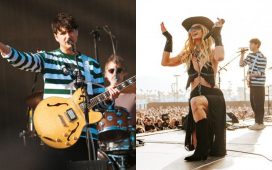Festival season is upon us, and the mud and sun are a sign that summer is coming. But I have only tried it once myself – Leeds festival in 2005. Packing for a weekend’s camping in sludge or blazing heat – or both – is tough enough. But for people with disabilities, it can require military-grade preparation, as well as mild disregard for personal safety.
I arrived at Leeds on the Saturday – after a night at a wheelchair-accessible budget hotel 20 minutes from the campsite – to find the entrance was atop a steep, three-metre (10ft) hill. The way out was no easier: I got trapped in the car park thanks to the erratic parking in the Blue Badge section. The whole thing was such a faff that I threw away my Sunday ticket and drove home.
Luckily, in the nearly 15 years since, there has been progress. Attitude Is Everything, a UK-based charity, partners with festivals including Glastonbury, Latitude in Suffolk, and Leeds and Reading to improve access for deaf and disabled people, while Stay Up Late provides a buddy system for those with learning disabilities. Most mainstream festivals now provide access arrangements, including viewing platforms, and two-for-one ticket schemes, so that disabled people can bring a personal assistant with them free of charge (something Leeds provided for me). There is also the Autism Arts festival, now in its third year, which provides relaxed live performances. I spoke to eight disabled festivalgoers about the joys and challenges they encounter in the pursuit of live music.
Hannah McKearnen, 26

McKearnen, who uses crutches due to a connective tissue disorder called Ehlers-Danlos syndrome and has a feeding tube 24/7, has been a regular at festivals for years. The best live performance she has seen was Anna Calvi at the BBC Radio 6 Music festival in Liverpool earlier this year. Festivals are a way to let her hair down, she says, to spend stress-free time with the “festival friends” whom she sees year on year in one field or another. As she puts it: “There’s nothing much to worry about once I’m in and my wristband is on.”
McKearnen has used Glastonbury’s accessible campsite, which includes accessible showers and toilets, as well as fridges to store medication. At Leeds, she uses a shuttle bus that goes from the campsite to the arena; this is crucial to help protect her knee joints and avoid the blackouts she gets if she stands for too long. Problems still arise – once, her feeding tube got pulled out painfully when she got stuck in a crowd – but she is keen to keep trying. “Last year, I braved my first festival abroad at Iceland Airwaves,” she says. “It was amazing, if not the most accessible.”
Sharon Brennan, 38

Brennan, who was born with cystic fibrosis and received a double lung transplant in 2013, became adept at taking medication at festivals in the mid-00s. At Glastonbury, she was able to see the White Stripes and the Killers by camping near the medical tent so she could plug her nebulisers into their mains electricity. “I put a spare set of meds in property storage in case people stole stuff from our tent,” she says. When she went to Reading for a day to see Beck, she used the medical tent to do her IV antibiotics. Mostly, she says, enjoying a festival while chronically ill involves sorting things out herself – and occasionally taking drastic action. “At a one-day Verve homecoming gig, the police sat in the front of their riot van so I could plug my neb into their car cigarette lighter.”
Liam O’Dell, 22

O’Dell, who is partially deaf, is a regular at Glastonbury and attended the now defunct V festival many times. He says the support available at Glastonbury is “incredible”, with the Deaf Zone providing British Sign Language (BSL) interpretation for many performances, as well as running free BSL workshops. Because he struggles to hear sounds from a distance, the size of the crowds can be a problem. “The large screens you often see at festivals help – especially when you can see the singers singing – but it essentially comes down to me watching a series of dance routines, rather than enjoying the music I came to listen to.”
The odd technical problem hasn’t put him off, though: the “weird bucket list” of artists he wants to see live is constantly expanding. He knows how powerful a festival performance can be. “Hearing the crowds sing along to Adele’s Make You Feel My Love during her 2016 headline performance, waving their phone lights in the air, is a moment I’ll never forget.”
Lisa Derrick, 38

Derrick, who has Crohn’s disease and endometriosis, has camped five times at Green Man in the Brecon Beacons and End of the Road in Wiltshire. However, she says: “Festivals aren’t very friendly for people with invisible disabilities.”
“I love the music, but being outdoors and cold the whole time is tricky when you hurt and get fatigued easily.” For Green Man in 2017, she hired a campervan with her boyfriend, to make her more comfortable. It was lush – a comfy bed, cushions and a kettle to make hot drinks – but, at £600, the cost was off-putting. “‘Standard’ events can feel inaccessible when you’re on a low income due to disabilities,” she explains, and having to pay even more can be impossible. Derrick would like to see festivals trial discounted tickets and lower pricing for disabled people who need campervans. “A mix of help in terms of making the event more physically comfortable and financially accessible would be great.”
Mitch Tinkler, 10

Mitch, who has Duchenne muscular dystrophy, says that having the perfect wheelchair is key to his festival experience. He has been going to the Deer Shed festival in North Yorkshire every year with his family since he was two. His mum, Kate, used a pushchair to help get him around as a toddler, but when he got too big for it the festival was suddenly out of bounds. The family crowdfunded for a year to raise £12,000 for an electric wheelchair; by the next summer, Mitch was back at Deer Shed. “The battery lasts all the weekend of the festival, but there are charging points and an accessible camp,” says Kate, 44. His new wheels mean Mitch is able to get to all his favourite areas: the ferris wheel, the comedy tent and, most importantly, the pizza stall.
Claudia Haberberg, 31

Haberberg, who is autistic and uses a wheelchair, went to the London festivals All Points East and Hyde Park Calling last summer, but she finds the unpredictable nature of festivals “challenging”. “I’m normally anxious for a week or so beforehand,” she says. On top of that, her biggest problem is the strobe lights often used throughout festivals. Her autism means she is extremely sensitive to bright light and powerful strobes at Hyde Park triggered an “absence seizure” – while she was conscious and moving around, she didn’t know what she was doing in the moment and had temporary memory loss afterwards. “I have flashes of memories of drunk men trying to talk to me, but I can’t remember how I got from the park to the station,” she says. “It’s scary.”
Despite the difficulties, Haberberg adores festivals for providing “that cinematic union” of weather, music and friendship. She remembers going to Latitude in 2012 after a bad breakup. For most of the weekend, the weather had been grim, but the sun came out just before Elbow took the stage. As the sun began to set and the sky turned pink, the band played Open Arms. “I cry-screamed my little heart out as they sang: ‘We’ve got open arms for broken hearts / Like yours, my boy / Come home again / Everyone’s here.’ Next to me was one of my dearest friends, who had welcomed my broken heart home just a few months before,” she says. “I wouldn’t trade that memory for anything.”
Lexi Porter, 21
Porter uses a wheelchair full-time and is a regular at Wireless festival in London. She loves the event, but has had two chaotic experiences. In 2016, she was watching Young Thug in a tent on a viewing platform when non-disabled festivalgoers climbed on top to get a better view. The extra weight made the platform collapse under her. The middle of the stage fell in on itself and people in electric wheelchairs slipped into the sunken area. “My PA got punched,” she says. “My other disabled friend was having a panic attack.” The following year, organisers implemented extra safety measures, including not allowing disabled ticket holders to leave until the crowd had gone. But the wait meant Porter and her friends missed the last Overground train to her house, leaving them stranded at the site. Even getting a bus wasn’t an option – most are designed to fit only one wheelchair. In the end, she had to take a train, the tube and a car to get home.
The organisers of Wireless have since met and spoken to her several times about improving access and she is optimistic for change. As a wheelchair user, the best part of any festival, she says, is that she can be with her disabled friends. While smaller venues often put only a couple of disabled spaces together, there are no such boundaries here. “At a festival, we all hang out.”
Esme Rice, nine

Esme enjoys festivals, but she prefers to use her wheelchair to see authors rather than bands. She has been going to Hay festival with her family for the past five years. “I’ve eaten ice-cream lying on a blanket in the sunshine surrounded by people reading quietly on deckchairs,” she tells me. “It’s the best feeling ever.”
The “amazing” staff always position her so she gets the best view of the speakers. “This is really good, because lots of other kids get to go on stage or join in and I don’t get to do that, so it’s nice to be at the front,” she says. Esme has met some of her favourite authors this way, including Michael Morpurgo and Liz Pichon; she even watched the late Judith Kerr read The Tiger Who Came to Tea. “It was magical,” she says. The only downside is some carelessness from her fellow festivalgoers: because she is small and low to the ground, she gets bumped into a lot, especially by people’s bags. Still, it would never stop her going. When we speak, she is counting down the days until her next Hay trip (the 2019 edition runs from 23 May to 2 June). “I go again in eight sleeps,” she says. “I can’t wait.”
• Comments on this piece are premoderated to ensure discussion remains on topics raised by the writer. Please be aware there may be a short delay in comments appearing on the site.













